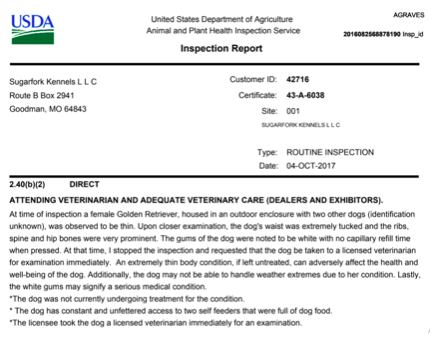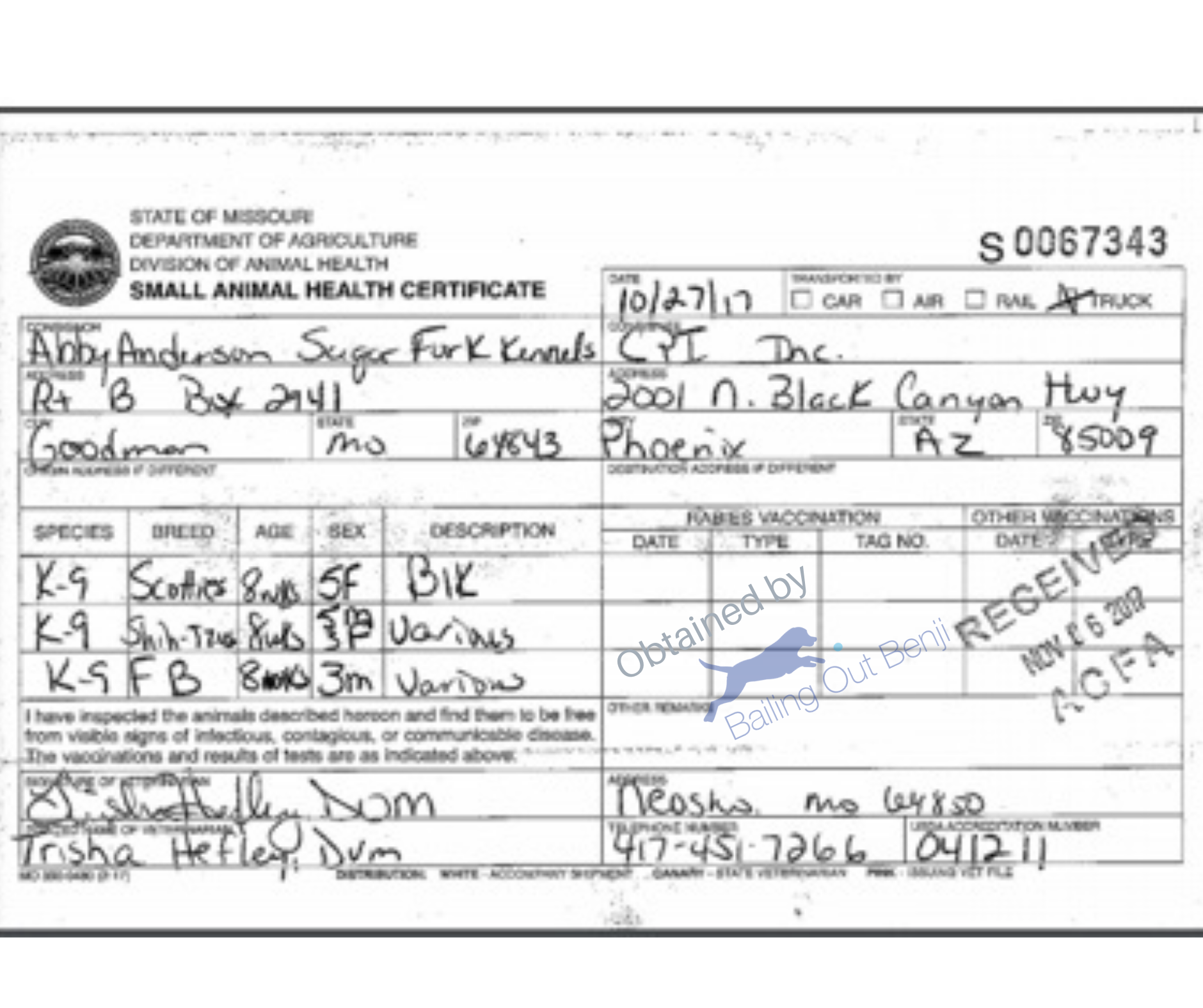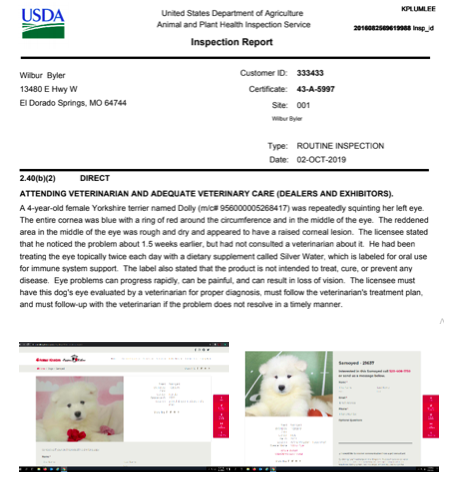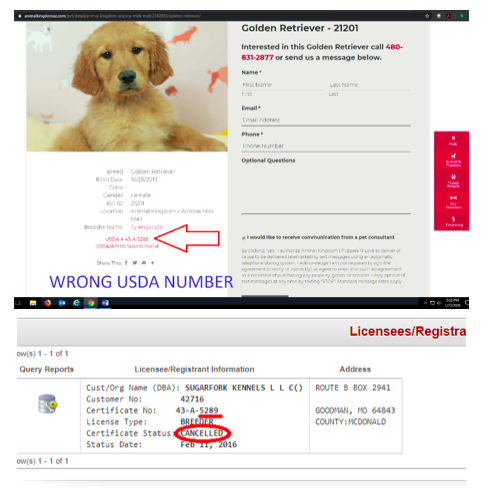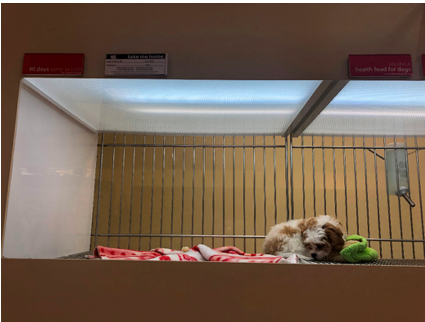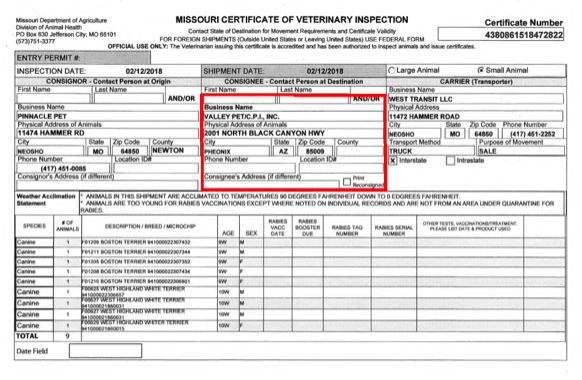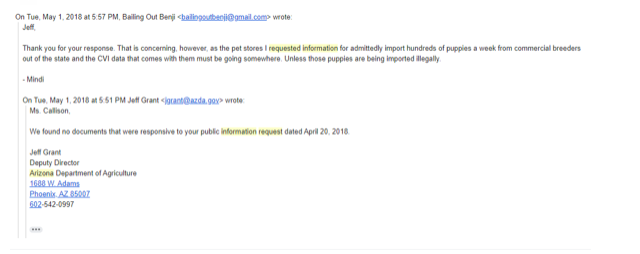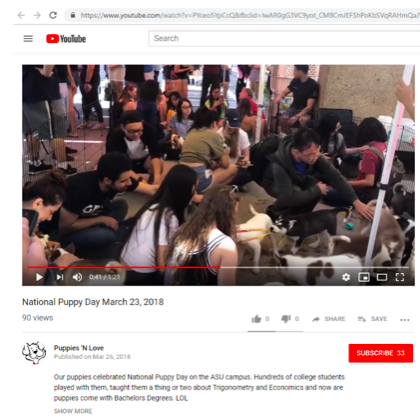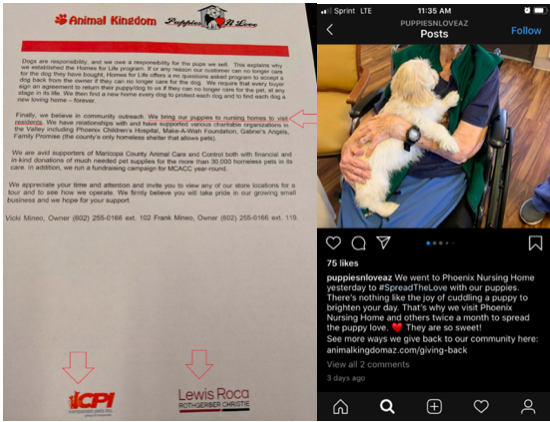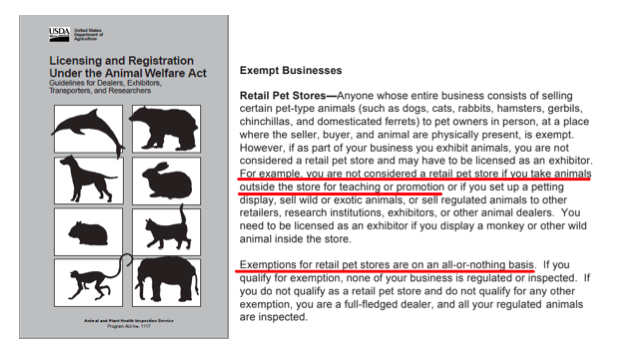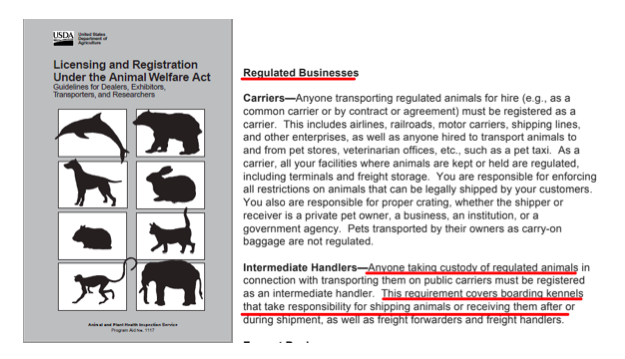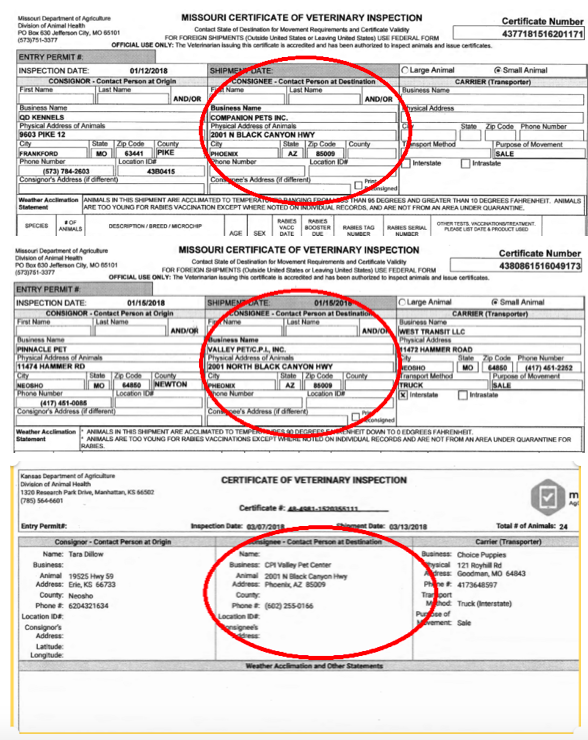©Bailing Out Benji 2020
Drafted by Nicole Galvan
After a years-long investigation, Bailing Out Benji (BOB) and our partners at Animal Wellness Action (AWA) requested that the Tempe Police Department and the Tucson Police Department to investigate allegations that local pet stores known as “Puppies N’ Love” and “Animal Kingdom” are purchasing puppies from certain breeders in violation of Arizona state law.
You can read the in-depth investigative report done by Arizona Central News here.
In 2016, Arizona Governor Doug Ducey signed SB1248 into law in an ill-fated attempt to stop pet stores from obtaining puppies from some of the worst puppy mills in the country, while simultaneously taking away the ability for Arizona cities to ban the sale of puppy mill dogs at the local level. The law stipulated that pet stores were not to buy dogs from breeders who have received direct violations of Animal Welfare Act in the last two years.
Arizona State Law Violations
Through a public records request to Arizona’s Department of Agriculture, the Iowa Department of Agriculture and the Missouri Department of Agriculture, Bailing Out Benji obtained health records from 2017 to early 2020, which connect Arizona pet stores to the breeders they source from. The records uncovered that more than 250 puppies from out-of-state breeders with direct violations of the Animal Welfare Act were shipped to the named pet stores during that timeframe, and re-sold to the public.
-
- Sugarfork Kennels: received a direct violation of the Animal Welfare Act in Oct 2017. For the following two years, Puppies N love and Animal Kingdom pet stores imported approximately 250 puppies from this breeding facility.
-
- Wilbur Byler: received a direct violation in October 2019. Since that time, at least 10 puppies have arrived in Arizona for resale.
The state law also provides that pet stores must list the name and license number of the breeder on each cage and in any electronic marketing, so that the public may research the breeders themselves. The pet stores do not comply fully with this legal standard either. BOB and AWA have documented instances of missing and incorrect information on cages, making it nearly impossible for buyers to receive the appropriate information about where their puppy came from.
This pet store chain had the Arizona state pet store laws written just for themselves and they lobby for them to stay in place every single year – yet they couldn’t even follow the laws that they helped write and pass for themselves. The scary thing is that other pet stores in other states are lobbying to copy this law – to preempt cities from banning these deplorable business practices outright. Not only has this law been incredibly difficult to get enforced, but it obviously didn’t deter these pet stores from getting puppies from puppy mills who commit egregious levels of abuse to the animals in which they make money off of.
Federal Animal Welfare Act Violations
In conducting research on the puppy mills used by this pet store chain, we also discovered that they are transporting the puppies from the puppy mills and brokers in the Midwest directly to a distribution center location, which is owned by Valley Pet/CPI in Phoenix.
Instead of transporting the puppies directly to each pet store location, they are transporting them to their corporate property at 2001 N. Black Canyon Highway in Phoenix. Here’s a sample of just one of the hundreds of Certificates of Veterinary Inspection (CVI), required for transport. These documents show that their puppies are coming from their respective puppy mill breeders and brokers and going to this one central distribution center:
This location is not a pet store. It is an industrial-type building and it is not open to the public. Former employees have come forward to tell us that the puppies are transported here, “cleaned-up,” and then sent to their respective pet store locations in the Phoenix metro area and Tucson. Bailing Out Benji has hundreds of documents, covering 3 years of this company’s operation, showing that all of the puppies are going to this location when they enter the state and the state veterinarian’s office, via email, informed us that they are not able to find any Certificate of Veterinary Inspection (CVI) transport documents that show puppies going directly to the individual pet store locations.
As an organization we regularly investigate pet stores and puppy mills across the country, and we have found this to be the only pet store chain in the United States that is operating a puppy distribution center like this – to our knowledge. Every pet store we have investigated to date, has their puppies transported from the puppy mills and brokers directly to the pet store locations – even if one person or one company owns several stores.
The reason that other pet stores do not operate this type of distribution center may be that it is likely in violation of the Animal Welfare Act. The USDA requires that “anyone taking custody of regulated animals in connection with transporting them on public carriers must be registered as an intermediate handler. This requirement covers boarding kennels that take responsibility for shipping animals or receiving them after or during shipment.” – USDA Guideline for Licensing and Registration Under the Animal Welfare Act
We have also caught this pet store chain violating the Animal Welfare Act by exhibiting animals without a license. The most up to date USDA Guideline for Licensing and Registration Under the Animal Welfare Act defines the following for “Exempt Businesses”:
“Retail Pet Stores—Anyone whose entire business consists of selling certain pet-type animals (such as dogs, cats, rabbits, hamsters, gerbils, chinchillas, and domesticated ferrets) to pet owners in person, at a place where the seller, buyer, and animal are physically present, is exempt. However, if as part of your business you exhibit animals, you are not considered a retail pet store and may have to be licensed as an exhibitor. For example, you are not considered a retail pet store if you take animals outside the store for teaching or promotion or if you set up a petting display, sell wild or exotic animals, or sell regulated animals to other retailers, research institutions, exhibitors, or other animal dealers. You need to be licensed as an exhibitor if you display a monkey or other wild animal inside the store. Exemptions for retail pet stores are on an all-or-nothing basis. If you qualify for exemption, none of your business is regulated or inspected. If you do not qualify as a retail pet store and do not qualify for any other exemption, you are a full-fledged dealer, and all your regulated animals are inspected.”
Here are photos of an event they held on March 2018, where they exhibited animals at Arizona State University in Tempe:
We also obtained a document, created by the owners of Companions Pets, Inc., and their lawyers, in which they admitted to exhibiting animals by saying “we bring our puppies to nursing homes to visit residents.”
This is document that was given to state lawmakers by the pet store chain’s lobbyists in August 2019 as well as a social media post where they admit to exhibiting animals at nursing homes.
Bailing Out Benji an Animal Wellness Action have filed complaints with the USDA about these Animal Welfare Act Violations, but the USDA has yet to respond to our complaints.
We are hopeful that the USDA as well as the local agencies in Tucson and Tempe tasked with enforcing the state pet store laws will follow through with their investigations.
We are a small nonprofit organization that makes big changes with very few resources. Our research is used by the leading animal welfare organizations across the country, because what we do is so unique and important. To make a one time donation or to sign up to be a sustaining supporter to allow us to continue our various programs that expose the puppy mill industry, click the donate button below.



